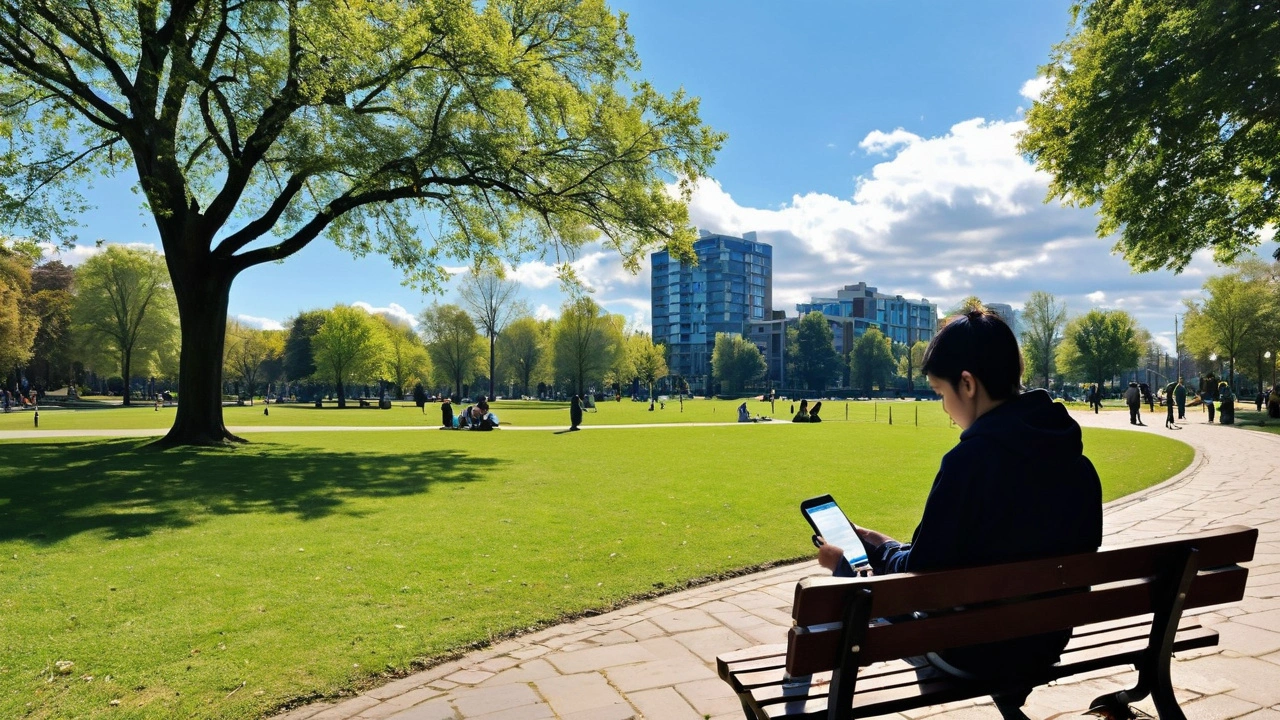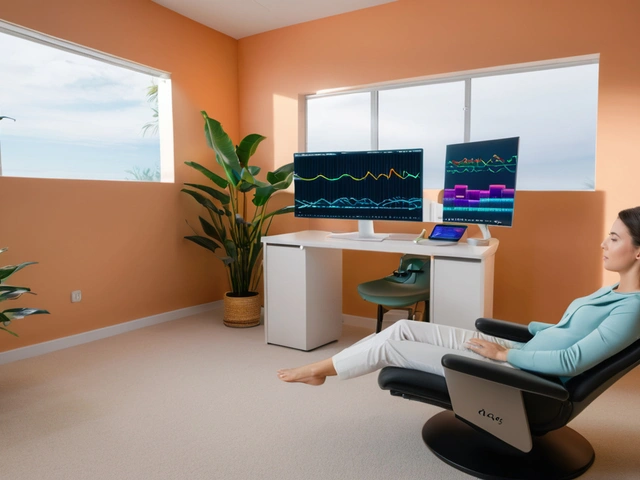
Health anxiety, sometimes known as hypochondria, occurs when a person becomes excessively worried about having a serious illness. This concern often stems not from actual medical symptoms, but from the fear of what could be wrong. Understanding why this happens is key to managing it.
People with health anxiety often misinterpret normal bodily sensations as serious ailments. This misinterpretation can come from a range of psychological factors, including past traumas, a family history of health concerns, or underlying anxiety disorders.
Recognizing common symptoms, such as frequent doctor visits, constant checking of the body for signs of illness, and excessive internet searches about health conditions, can help in identifying health anxiety early.
Living with health anxiety can be exhausting. It can interfere with work, relationships, and daily activities. However, there are various strategies that can help, from cognitive-behavioral therapy to mindfulness practices. Learning effective ways to soothe these anxiety-driven thoughts can make a world of difference.
For some, professional help might be necessary. Consulting with a mental health professional can provide the support and tools needed to manage health anxiety and improve quality of life.
- What is Health Anxiety?
- Psychological Factors
- Common Symptoms
- Impact on Daily Life
- Effective Coping Mechanisms
- When to Seek Professional Help
What is Health Anxiety?
Health anxiety, often referred to as hypochondriasis, is an overwhelming fear of having a serious illness. This anxiety isn’t necessarily triggered by actual physical symptoms, although it can be. Sometimes, people with health anxiety might misinterpret normal bodily functions—like a headache or a slight rash—as signs of something much graver. This can lead to a relentless spiral of worry that is difficult to break.
Health anxiety is a part of a broader category known as anxiety disorders. It is characterized by the preoccupation with the belief that one is suffering from a severe health issue, despite medical reassurance to the contrary. This preoccupation can consume hours of a person's day, affecting their ability to perform regular activities and enjoy life. It's not just about worrying occasionally; it's a persistent state of fear that something is seriously wrong with one's health.
The disorder can be fueled by a variety of factors. For instance, the sheer amount of health information available on the internet, often with worst-case scenarios prominently featured, can exacerbate fears. This tendency to self-diagnose via online searches is sometimes humorously referred to as "Dr. Google." Some experts believe that early experiences with illness, either personal or observed in family members, can lay the groundwork for health anxiety. Trauma and heightened sensitivity to pain or bodily sensations also play significant roles.
Understanding health anxiety involves recognizing its symptoms. These can include repeatedly checking the body for signs of illness, frequent visits to doctors for reassurance, avoiding activities that might expose one to illness, and compulsively looking up health information on the internet. In many cases, these behaviors are driven by the belief that early detection of a serious condition could be life-saving. Interestingly, this intense focus on health often leads to more anxiety, creating a vicious cycle.
"The greatest weapon against stress is our ability to choose one thought over another." — William James
It's important to note that health anxiety is not merely an attention-seeking behavior. It's a genuine mental health issue that can cause considerable distress and impairment. Those suffering from it require understanding and support, not dismissal. Cognitive-behavioral therapy (CBT) has shown to be particularly effective, focusing on changing the thought patterns that fuel the anxiety. Mindfulness and stress management techniques are also beneficial, helping individuals stay grounded and reduce their hyper-focus on health fears.
In extreme cases, medication might be prescribed to help control the symptoms. Selective serotonin reuptake inhibitors (SSRIs) can be particularly useful in managing the anxiety component. Regular therapy sessions and support groups also offer consistent support and understanding from others who face similar challenges.
Health anxiety affects many people and can profoundly impact daily living. However, by recognizing the signs and seeking appropriate help, individuals can lead more balanced lives, free from the debilitating grip of constant health worries.
Psychological Factors
Health anxiety is not just about worrying over health issues. It is deeply rooted in a person's psychology and can stem from a variety of experiences and predispositions. One significant contributor is past trauma. People who have experienced serious illness themselves or seen a loved one go through a health crisis are often primed to be hyper-aware of their own health. This heightened awareness turns into anxiety when every ache and pain is perceived as a sign of something serious.
Another crucial factor is a family history of health problems. Growing up in an environment where health issues were frequently discussed or even witnessed can set the stage for health anxiety. Individuals may learn to be overly cautious or anxious about their health, mirroring what they saw in childhood. This can lead to a cycle of worry and reassurance-seeking behavior that is hard to break.
Stress and underlying anxiety disorders also play a significant role. When life is full of stressors, whether they are job-related, financial, or personal, it can manifest as health anxiety. The mind may fixate on the body as a way of coping with the ongoing stress, albeit in an unhealthy manner. Similarly, disorders like generalized anxiety disorder (GAD) can amplify concerns about health, turning them into chronic worries.
Moreover, cognitive patterns such as catastrophizing can exacerbate health anxiety. This means that an individual might take a minor symptom and imagine the worst possible outcome. A simple headache becomes a brain tumor, and a stomach ache suggests a deadly disease. This thought pattern is hard to break without targeted therapy.
Interestingly, the advent of modern technology has added a new layer to health anxiety. The ease with which we can look up symptoms online can lead to 'cyberchondria.' Many people fall into the trap of endlessly searching for information on potential illnesses, which only serves to heighten their anxiety. Health-related websites and forums, while informative, often contain worst-case scenarios that can be frightening.
According to Dr. Helen Stokes-Lampard, Chair of the Royal College of General Practitioners, "The incessant checking of health information online can be a double-edged sword. It empowers, but it also raises levels of anxiety beyond healthy awareness."
Ultimately, the combination of these factors creates a perfect storm for health anxiety. Understanding them is the first step toward managing the condition. Awareness of one's cognitive patterns, family background, and personal experiences can shed light on why health anxiety happens and offer a pathway to mitigate its impact. Engaging in self-reflection or discussing these factors with a therapist can pave the way for healthier coping mechanisms.

Common Symptoms
Health anxiety can manifest in many ways, often affecting both the mind and body. One of the most telling signs is the persistent fear of having a serious illness despite medical reassurance. People with health anxiety often find it hard to shake off the idea that something is terribly wrong, even when tests and doctors confirm their health is good.
This condition may lead to frequent doctor visits, as individuals seek validation for their concerns. However, this reassurance might only provide temporary relief. The worry tends to creep back, causing them to schedule another appointment or switch doctors, believing the previous one missed something.
Another common symptom is the habit of repeatedly checking the body for signs of illness. This might involve feeling for lumps, checking moles, or monitoring vital signs like heart rate. Such behaviors can become obsessive, significantly disrupting daily life.
People with health anxiety often spend a lot of time researching symptoms online. This phenomenon, sometimes called 'cyberchondria,' can intensify anxiety. Reading about worst-case scenarios can lead to new worries and a vicious cycle, where each new piece of information fuels further anxiety.
Their anxiety can cause physical symptoms too. Common physical manifestations include headaches, stomach aches, and muscle tension. Because these symptoms are real, they can reinforce fears, creating a feedback loop that amplifies both physical discomfort and anxiety.
Additionally, individuals may avoid certain activities or places due to fears of becoming ill. This avoidance can affect social life and work, leading to feelings of isolation or helplessness. For example, someone might refuse to go to a park believed to be full of germs, or start skipping gatherings where they imagine they could catch something contagious.
This relentless focus on health can lead to anxiety related to other aspects of life, such as financial worries due to medical bills, or strained relationships with loved ones who may find it hard to understand these fears. Some people might even face difficulties at work because their constant checking and doctor visits could interfere with their job performance.
Dr. Hans Eysenck once noted, ‘Anxiety is the handmaiden of creativity’. While this might hold true in some situations, it’s important to recognize when anxiety starts to disrupt one’s daily routine or overall wellbeing.
Understanding these common symptoms is the first step toward managing health anxiety. Recognizing that these behaviors and thoughts are part of a mental health issue, rather than signs of a physical illness, can be crucial for seeking the right kind of help.
For a clearer perspective, consider this: A study published in the British Journal of Psychiatry found that cognitive behavioral therapy (CBT) significantly helped those with health anxiety, reducing their symptoms by teaching them to challenge their anxious thoughts and behaviors.
Impact on Daily Life
Health anxiety can profoundly affect a person's daily life in many ways. Waking up with the thought that something might be wrong can set the tone for the entire day. These constant worries can make it hard to focus on work, resulting in decreased productivity and strained relationships with colleagues. The anxiety can spill over into personal life too, making it difficult to enjoy activities or spend quality time with loved ones.
For many people, the uncertainty around their health can lead to avoidance behaviors. They might skip social events, exercise, or other activities fearing that these could aggravate their imaginary conditions. This avoidance, while intended to protect, actually reinforces the anxiety, creating a vicious cycle that's hard to break. Daily routines often become centered around health checks and doctor visits, leaving little room for anything else.
The digital age has added another layer to this problem. Many individuals with health anxiety frequently turn to the internet for information. This behavior, known colloquially as 'cyberchondria,' can exacerbate their fears instead of helping. The vast amount of information available online, much of which is not vetted by professionals, can lead to self-diagnosis and further stress. According to a study, excessive searching for health issues on the internet can heighten anxiety levels and even trigger panic attacks.
Dr. Steven Taylor, a clinical psychologist, notes, "Health anxiety often arises from a mix of psychological, social, and biological factors. It's a learned behavior that can be unlearned with the right therapeutic support."Maintaining relationships can become challenging when health anxiety is involved. Friends and family might not understand the extent of the individual's fears, leading to frustration on both sides. Over time, this can result in isolation, as the person with health anxiety might withdraw to avoid judgment or misunderstandings.
Physical health isn't immune to the impact of health anxiety either. Constant stress and worry can lead to real physical symptoms, like headaches, muscle tension, and stomach issues. In some cases, these individuals might insist on unnecessary medical treatments or tests, which can be both expensive and harmful in the long run. The National Institute of Mental Health states that anxiety disorders, including health anxiety, can increase the risk of developing chronic illnesses such as heart disease.
Understanding the impact health anxiety has on daily life can be the first step toward managing it. Acknowledging the ways it interferes with normal activities is crucial for seeking help and finding effective coping strategies. Addressing health anxiety can lead to improved quality of life, better interpersonal relationships, and a more balanced approach to health and wellness.

Effective Coping Mechanisms
Managing health anxiety can feel like a herculean task, but several tried-and-true methods have been shown to be effective. One of the most sought-after strategies is cognitive-behavioral therapy (CBT). CBT helps individuals reframe their negative thoughts about health into more balanced, realistic viewpoints. It allows them to identify and challenge irrational fears by understanding their thought patterns.
Mindfulness and relaxation techniques are another way to manage health anxiety. Practices such as meditation, deep breathing exercises, and progressive muscle relaxation can reduce stress and anxiety levels. These techniques help tune out the incessant worry by focusing the mind on the present moment. According to Harvard Health, “Mindfulness-based stress reduction has been shown to improve psychological well-being” and can be a crucial tool for those struggling with health anxiety.
Engaging in regular physical activity releases endorphins, the body's natural mood lifters. Exercise can tackle the physical symptoms of anxiety, like muscle tension and fatigue, while also improving overall mental health. A consistent exercise routine, even something as simple as daily walks, can make a notable difference.
Dr. Mark Winwood, a renowned psychologist, states, “Exercise is not just about aerobic capacity and muscle size. It also means a healthier state of mind. Regular physical activity can help relieve anxiety by releasing feel-good endorphins.”
Limiting exposure to health-related information, often termed as 'information hygiene,' is essential. People with health anxiety frequently become preoccupied with researching symptoms online, which can escalate their fears. Setting boundaries around this activity, such as allocating specific times to check health information, minimizes unnecessary worry.
Another effective strategy is maintaining a gratitude journal. This simple practice involves writing down things you are grateful for each day. It helps shift the focus from anxiety-inducing thoughts to positive aspects of life. Over time, this can create a more optimistic and grounded outlook.
Social support is incredibly valuable. Talking to trusted friends or family members about your worries can provide a sense of relief. Support groups, both online and offline, offer a communal space to share experiences and coping strategies. Knowing you're not alone in your struggles can be very comforting.
Lastly, it's essential to know when to seek professional help. While self-help strategies can be beneficial, there are times when the guidance of a mental health professional is crucial. Therapists can offer personalized treatment plans and tools tailored to effectively manage health anxiety, reinforcing the idea that seeking help is a sign of strength, not weakness.
When to Seek Professional Help
Recognizing when to seek professional help for health anxiety can be a crucial step towards reclaiming your life. While it’s natural to be concerned about health, there are times when these worries go beyond the point of normal concern and start to interfere with daily functioning. If you find yourself constantly preoccupied with the fear of having or developing a serious medical condition, it might be time to consider consulting a mental health professional.
Persistent anxiety about health can manifest in many ways. You might notice that your concerns aren't reassured even after receiving a clean bill of health from doctors. This often leads to continuous doctor visits and tests, which further perpetuate the anxiety cycle. For some, this might also mean irrationally avoiding doctor's appointments out of fear, yet paradoxically worrying about undiagnosed conditions. This paradox can create an exhausting mental loop that is hard to break without professional support.
Another sign it's time to seek help is if your health anxiety is causing significant impairment in your daily life. Perhaps you are finding it difficult to focus at work, or you avoid social situations for fear you might encounter germs or hear about others’ health issues. When health concerns start to interfere with your ability to enjoy life and connect with others, it’s essential to consider professional help.
As explained by Dr. Sarah Lowe, a psychologist specializing in anxiety disorders, "Health anxiety can deplete one's cognitive and emotional resources, reducing their ability to cope with other stressors effectively." Seeking professional help can prevent the anxiety from overwhelming other aspects of life.
These professionals can offer a range of effective treatments, such as Cognitive Behavioral Therapy (CBT). CBT is a practical approach that helps you challenge and change unhealthy thought patterns. It involves learning skills to manage and reduce anxiety, helping you to face and alter the irrational beliefs driving your worries. Through CBT, many find substantial relief and can reclaim their quality of life.
In addition to CBT, medications can also be prescribed in some cases to help manage symptoms. Selective Serotonin Reuptake Inhibitors (SSRIs), for instance, are often used to treat anxiety and have been found helpful in treating health anxiety as well. If your healthcare provider suggests medication, it’s important to approach this option with an open mind, recognizing that, for some, a combination of therapy and medication is the most effective approach.
Support groups and counseling sessions also offer significant benefits. Connecting with others who share similar experiences can make a difference. Knowing you’re not alone and learning how others have navigated their journey can provide comfort and practical strategies. Many communities and online platforms offer support groups specifically to help those dealing with health anxiety.
Monitoring your progress with a health professional ensures a structured and tailored approach to recovery. Regular check-ins and assessments can measure improvements and adjust treatment plans as necessary. This ongoing support is instrumental in maintaining the progress made and in preventing relapses.
While the thought of seeking professional help might feel daunting, it is a powerful step towards improvement. If you're dealing with persistent health anxiety, you don’t have to go through it alone. Help is available, and taking that step can lead to meaningful and lasting change.





